Cats are great pets. They are independent enough to give you space but love to cuddle when the time is right.
That’s why nearly 100 million households in the U.S. own cats. But there are always some pros and cons to owning a pet.
That’s true with cats, too. You might have several problems with your cat. One possible issue could be that it continually scratches your walls.
Cats scratch walls for a few different reasons. Yours could be marking its territory, keeping its claws healthy, or de-stressing itself.
You can fix the problem by purchasing scratching posts and trimming your cat’s nails more often. You might also consider pheromone therapy if the first two tactics don’t work.
Why Does My Cat Scratch The Wall?
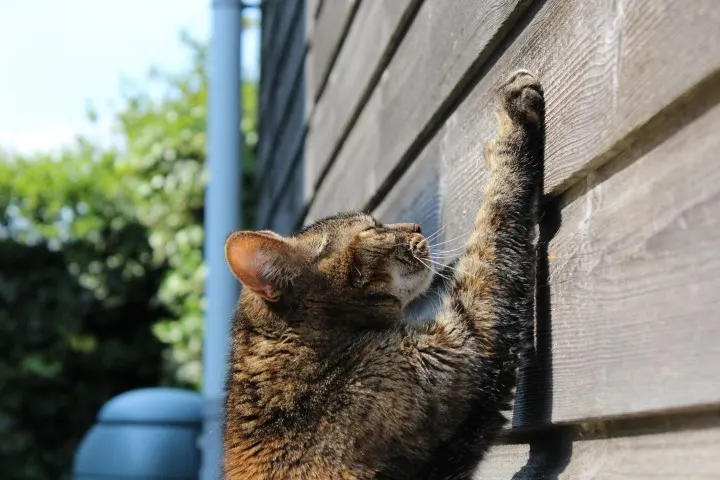 Though your cat may scratch several parts of your home, walls might be their favorite. That could be true for a few different reasons. Here are three examples of why your cat might be scratching your walls.
Though your cat may scratch several parts of your home, walls might be their favorite. That could be true for a few different reasons. Here are three examples of why your cat might be scratching your walls.
Marking Their Territory
Cats are very territorial creatures. This is a behavior that they inherited from their ancestors. When they scratch their walls, it could be an expression of this ancient instinct.
That’s because cats have sweat glands located between their paw pads. When they scratch on a surface, these glands leave a scent. That scent is the cat’s way of marking its territory. So it scratches your wall, leaves its scent, and warns other felines that this area is its territory.
Note that this could happen even if no other cats are in your area. Cats like to assert their ownership of things. That’s true, even if doing so may not appear necessary to you for any reason.
Keeps Claws Healthy
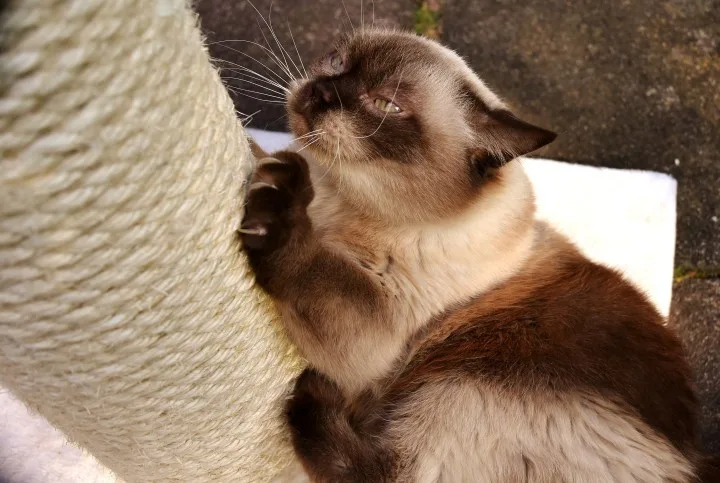 This is another big reason why cats like to scratch things like walls. Cats’ claws are what they use in the wild to pounce on prey and hold them down. They instinctually want their claws to be super sharp because of this.
This is another big reason why cats like to scratch things like walls. Cats’ claws are what they use in the wild to pounce on prey and hold them down. They instinctually want their claws to be super sharp because of this.
Scratching walls is one way for a cat to sharpen its claws. Over time, claws develop a sheath, which becomes dull. This gets worn down when the cat scratches the wall.
As the claw sheath gets worn down, it makes room for new claws to grow in its place. That new claw will be much sharper than the old one. This is a continuous process that cats use to keep their nails sharp. It’s an instinctual behavior that they do without thinking.
The Practice De-Stresses Them
Cats can get stressed out over many different things. They could be worried about another cat in their territory or hear movements and sounds that stress them out. When these things happen, the cat needs to find a way to get itself back to a happy state.
Scratching a wall is one way a cat can feel good again. The practice is soothing to them. When they scratch a wall, they reduce their anxiety and start to feel like themselves again.
This could be the cause of your cat’s wall scratching if it’s in a new home. It could also cause the problem if you recently added a new animal to your home.
How Do I Get My Cat To Stop Scratching The Walls?
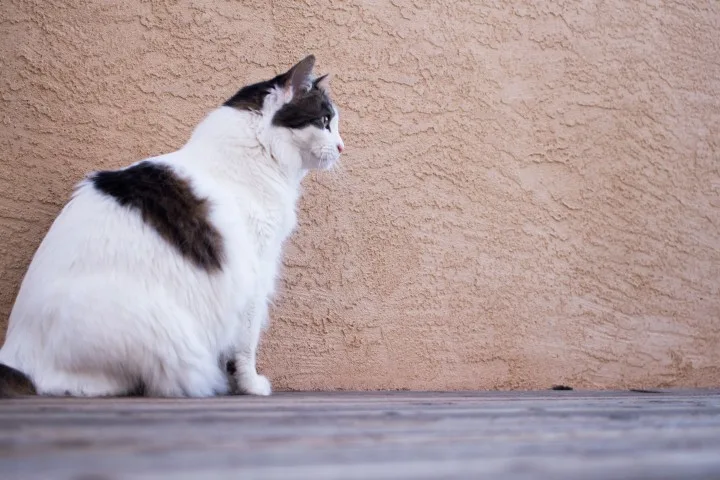 If your cat is damaging your walls, you probably want them to stop scratching. Thankfully, there are a few different easy ways to make that happen. Here are some options that you might try.
If your cat is damaging your walls, you probably want them to stop scratching. Thankfully, there are a few different easy ways to make that happen. Here are some options that you might try.
Buy Scratching Posts
If you want your cat to stop scratching your walls, try giving them something better to scratch. Scratching posts are perfect for this.
They were specifically designed to make cats want to scratch them. There are also many different types of scratching posts for you to choose from. You can get a vertical pole, a pad that sits on the floor, or various other types.
Try putting the post near the wall where your cat usually scratches. The hope is that they will see the post and scratch it instead of the wall. You can even try adding a bit of catnip to the post. This could get the cat more interested in scratching on it if it’s initially reluctant to do so.
Trim Their Nails Regularly
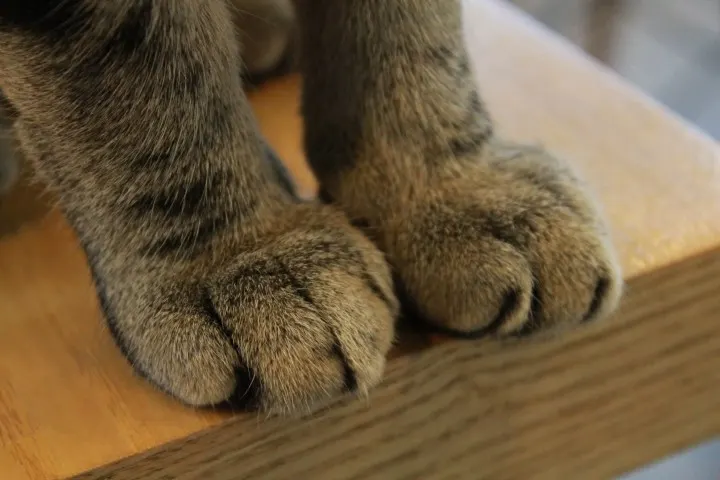 One reason that cats scratch walls is to keep their nails in good shape. You may reduce their urge to scratch if you do that for them. This would mean trimming your cat’s nails regularly.
One reason that cats scratch walls is to keep their nails in good shape. You may reduce their urge to scratch if you do that for them. This would mean trimming your cat’s nails regularly.
You can try doing this yourself if you think your cat will let you. But if they don’t, you may want to take them to the vet to get it done. It’s also okay to try another strategy if this is one that you don’t want to do.
Try Pheromone Therapy
Cats sometimes scratch walls because of pheromones left on them by other felines. This could be what’s happening if there are multiple cats in your home. In that case, pheromone therapy could be the solution that you’ve been searching for.
It involves purchasing synthetic variants of the cat’s natural pheromones. This will help them feel safer and more secure during stressful situations. There are major brands that sell these products, including Comfort and Feliway.
Consider Letting Them Go Outside
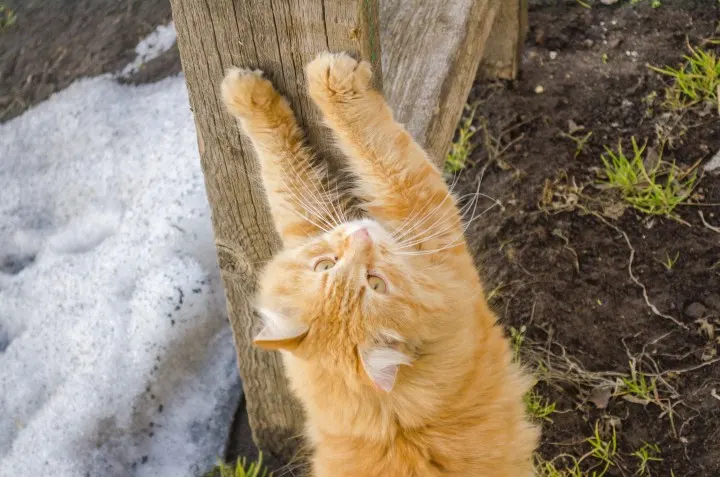 Sometimes, cats will scratch walls because they feel constrained in their environment. When this happens, the solution could be to give your cat more space. And that typically means letting them explore the outdoors.
Sometimes, cats will scratch walls because they feel constrained in their environment. When this happens, the solution could be to give your cat more space. And that typically means letting them explore the outdoors.
Allowing a cat to spend some time outside could help them eliminate their excess energy. Hopefully, they’ll be too tired to worry about scratching your walls when they get home.
Of course, this strategy comes with a few risks. Outdoor cats tend to live shorter lives than indoor cats do. So make sure you carefully weigh the risks before letting your cat out.
Do Cats Only Scratch The Wall?
Cats seem to scratch walls more than they scratch many other parts of our homes. But if you find your cat scratching your walls, it may also be scratching elsewhere.
Finding these other areas is a good way to determine how severe your cat’s scratching problem is. You should look for evidence of scratching in the following places:
- Furniture
- Outdoor posts
- Trees
- Couches
- Carpets
- Floors
- Reflective surfaces
Should You Get Your Cat Declawed?
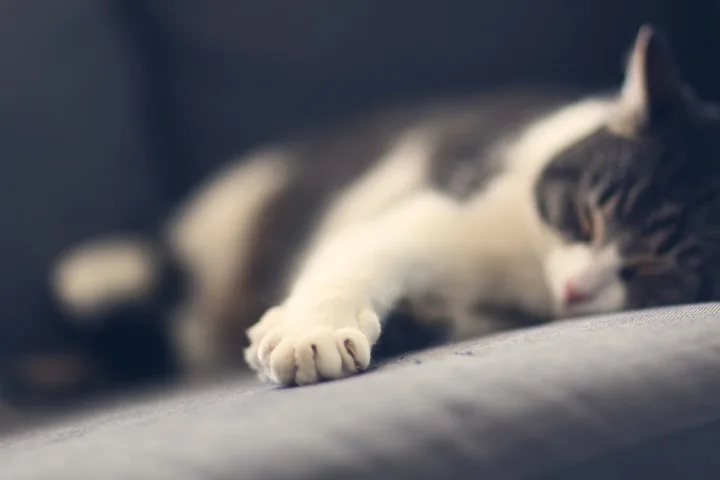 Maybe you feel as though you’ve tried everything, and nothing has worked. You may be tempted to declaw your cat if you think you don’t have any other option. But this is actually a very bad idea for a few different reasons.
Maybe you feel as though you’ve tried everything, and nothing has worked. You may be tempted to declaw your cat if you think you don’t have any other option. But this is actually a very bad idea for a few different reasons.
First, the declawing procedure often leads to infections. It usually takes off more than the cat’s nail, too.
Second, the claw is the cat’s main form of self-defense. They will have no way of dealing with fear and anxiety without their claws. This could cause them to lash out with biting and other more aggressive forms of behavior.
Additionally, research has found that declawing a cat causes lasting foot pain. This can be especially bad when they use the litterbox.
Declawing a cat is considered inhumane for all of these reasons. Doing so will make the cat’s life more painful. It will also rob them of one of the most essential parts of being a cat. By declawing a cat, you make its life considerably worse for your mild convenience.
Why Does My Cat Scratch The Walls After Pooping?
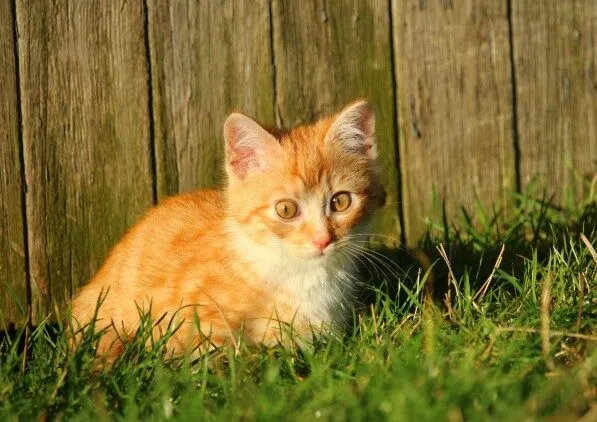 You might notice that your cat only likes scratching the wall after pooping. This is an instinctual behavior. Cats have a natural tendency to bury their poop.
You might notice that your cat only likes scratching the wall after pooping. This is an instinctual behavior. Cats have a natural tendency to bury their poop.
It’s because they don’t want other cats to pick up the scents of the excrement. Cats are also naturally clean animals.
They don’t like the smell of waste. Sometimes, a cat will instinctually scratch the wall, looking for the right spot to hide its mess.
Related Questions
Why Does My Cat Scratch After Eating?
Cats also sometimes start scratching after they eat food. The reason they do this is pretty straightforward. Basically, they want to hide their food for a later time. Sometimes a cat will scratch a wall out of this instinct.
There’s a second reason why some cats scratch after eating. They could be doing it if they don’t like the smell of the food. The idea is that they’re trying to hide the bad smell by “burying it” in the wall.
Is My Cat Happy Or Sad When It Scratches The Wall?
Cats can scratch walls out of both happiness and boredom. It’s usually easy to tell what is happening when you know what signs to look for.
Cats scratch playfully when they’re feeling good. This typically happens after they’ve eaten a good meal. Or it could happen when they’re playing with you.
Cats can also scratch when they’re bored. This might happen if they’re tired of the toys they have. The cat, not knowing what else to do, could mischievously scratch the wall to get your attention.
One possible issue may be that it continually scratches your walls. One potential issue may be that it continually scratches your walls.
Our team is composed of pet care professionals, veterinarians, and pet owners. To date, we’ve conducted thousands of hours of research to publish the most accurate pet information.
Most of the writers on our site are vets with 10+ years of clinical experience, ranging from small practice, to equine practice, academia, and surgery. Our goal is to help every pet owner get the information they seek about their dear companions.


Leave a comment
You must be logged in to post a comment.